Can Employer Refuse to Hire me for Refusing a Drug Screening

Understanding Employer Screening Practices
Pre-employment screening is a cornerstone of modern hiring practices, especially in industries where safety, security, and trustworthiness are paramount. Employers often require job applicants to undergo drug screening tests and background checks as part of the hiring process. These screenings help verify that candidates meet the necessary qualifications, comply with workplace safety standards, and align with company values.
Drug tests assess whether applicants have recently used controlled substances that could impair job performance or pose risks in safety-sensitive roles. Similarly, background checks provide critical information about an applicant’s criminal history, employment record, and educational qualifications, allowing employers to make informed decisions.
Why Employers Require Drug Screening Tests
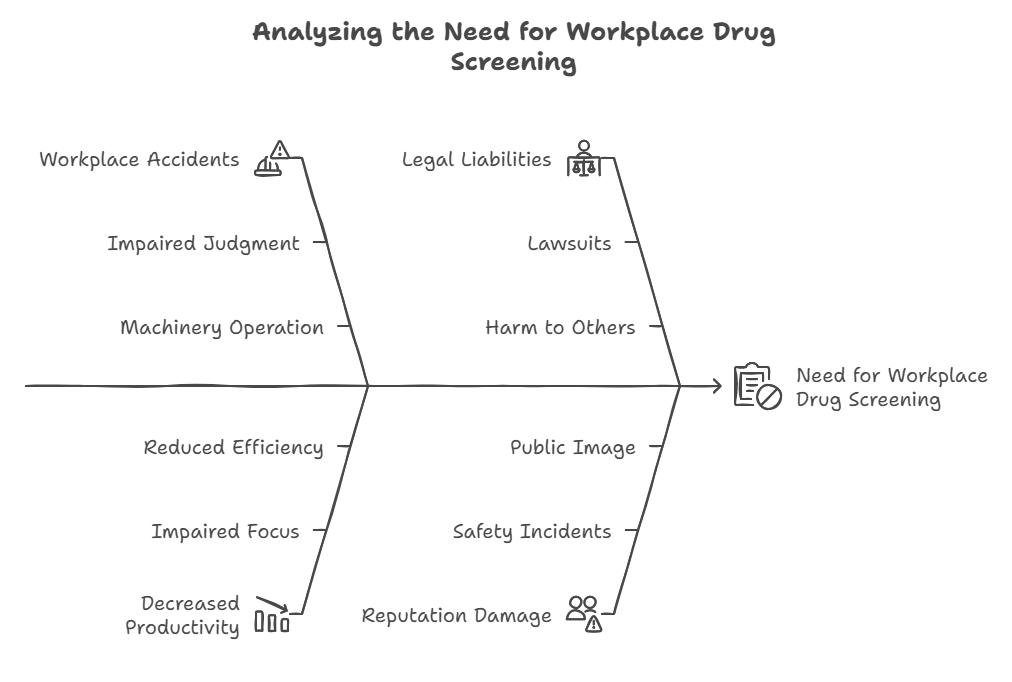
Drug screening tests are crucial for employers aiming to maintain a safe and productive work environment. In roles that involve operating machinery, handling sensitive information, or ensuring public safety (e.g., transportation, healthcare, or law enforcement), substance use can have catastrophic consequences. By implementing drug testing policies, employers mitigate risks such as:
- Workplace Accidents: Employees under the influence of drugs or alcohol are more likely to cause accidents, resulting in injuries or fatalities.
- Decreased Productivity: Substance use can impair focus, judgment, and performance, leading to reduced efficiency.
- Legal Liabilities: Employers may face lawsuits if an impaired employee causes harm to others.
- Reputation Damage: Safety incidents related to substance use can tarnish a company’s image.
According to the Substance Abuse and Mental Health Services Administration (SAMHSA), nearly 70% of individuals using illegal drugs are employed, making workplace drug testing a critical preventive measure.
The Importance of Background Checks
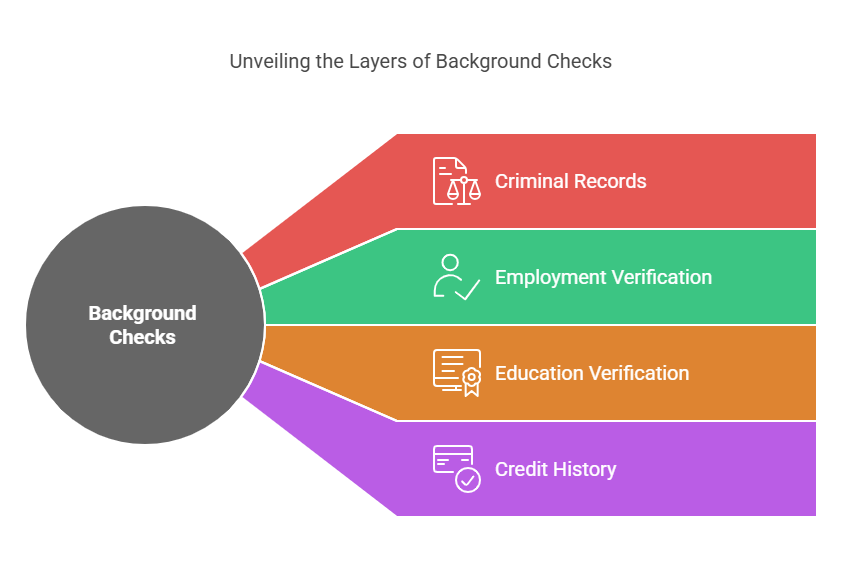
Background checks are another essential screening tool for employers. They provide a comprehensive view of a candidate’s history, verifying whether their qualifications and character align with the requirements of the role. Common components of a background check include:
- Criminal Records: Employers use this to identify potential risks, especially for positions involving trust or public safety.
- Employment Verification: This ensures that a candidate’s work history aligns with their resume.
- Education Verification: Some positions require specific degrees or certifications, and this step confirms the authenticity of those claims.
- Credit History: Relevant for roles involving financial responsibilities, this provides insight into a candidate’s financial stability and decision-making skills.
Employers conducting background checks aim to protect their organization, employees, and clients from potential fraud, theft, or workplace misconduct. For example, in roles involving vulnerable populations, such as caregiving or education, background checks ensure that applicants have a clean record of conduct.
Implications of Refusing a Drug Screening Test or Background Check
Refusing to undergo a drug test or background check can have significant consequences for job seekers. While candidates have the right to decline these screenings, doing so often raises red flags for employers. Refusal is commonly interpreted as non-compliance or an attempt to conceal negative information, which can lead to immediate disqualification from the hiring process.
Perceived Red Flags
When an applicant refuses to participate in a screening, employers may assume:
- The candidate has a history of substance use or a criminal record they wish to hide.
- The individual lacks transparency or integrity, which are crucial traits for many positions.
- The applicant may not fully understand or respect the company’s policies.
Impact on Hiring Potential
Employers view compliance with drug screening and background checks as a measure of reliability and trustworthiness. In competitive job markets, where several candidates may be equally qualified, a refusal to undergo these screenings can significantly reduce a job seeker’s chances of being hired.
Industries That Prioritize Pre-Employment Screening
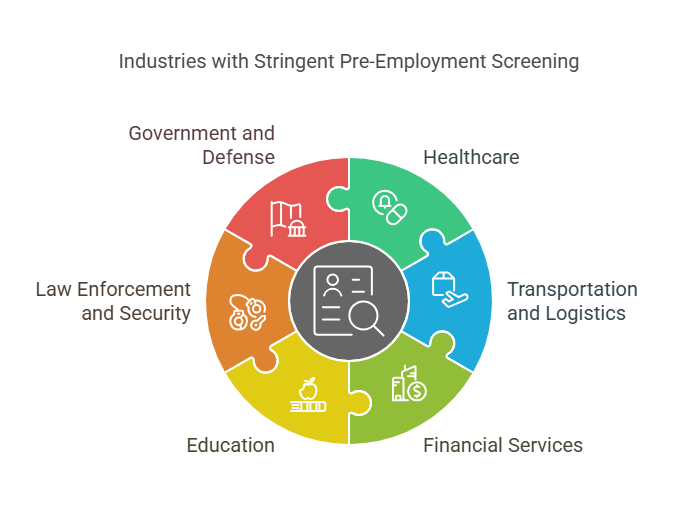
Certain industries have more stringent requirements for pre-employment screening due to the nature of their work. Below are some industries where drug screening tests and background checks are commonly mandatory:
1. Healthcare
Healthcare professionals work with patients and sensitive medical information, making safety and trust critical. Drug screenings ensure that medical staff can perform their duties responsibly, while background checks verify that individuals do not have a history of malpractice or criminal activity.
2. Transportation and Logistics
Employees in transportation roles, such as truck drivers and pilots, must operate vehicles safely. The Department of Transportation (DOT) requires drug testing for positions involving commercial driving. Background checks also verify the validity of commercial driver’s licenses (CDLs) and driving records.
3. Financial Services
Roles in banking, investment, and financial management involve handling sensitive data and significant financial transactions. Background checks help employers identify candidates with clean credit histories and no record of financial misconduct.
4. Education
Teachers, administrators, and other school staff must pass stringent background checks to ensure the safety of students. Criminal history checks are particularly critical for identifying any past offenses that could pose risks to children.
5. Law Enforcement and Security
Positions in law enforcement and private security require individuals to uphold public safety. Drug screenings and thorough background checks help maintain the integrity and professionalism of the workforce.
6. Government and Defense
Federal agencies and defense contractors require detailed background checks, often including security clearance evaluations, to ensure candidates meet national security standards.
Statistics on Employer Screening Practices
The prevalence of drug screening tests and background checks underscores their importance in the hiring process. According to a 2022 survey by the Society for Human Resource Management (SHRM):
- 94% of employers conduct background checks on job candidates.
- 57% of employers conduct drug tests during the hiring process, with higher rates in safety-sensitive industries.
- 78% of employers have rescinded job offers based on findings from background checks.
These statistics highlight how integral these practices are to maintaining workplace safety, compliance, and efficiency.
Comparison of Refusal Rates and Policies
While most candidates comply with pre-employment screening requirements, some may choose to refuse. However, it’s important to note that refusal rates vary depending on industry norms and company policies. For example:
- In industries where drug testing is mandated by law (e.g., transportation), refusal almost always leads to disqualification.
- In less regulated industries, employers may assess refusals on a case-by-case basis, although they often favor candidates who comply.
How Employers Handle Refusals
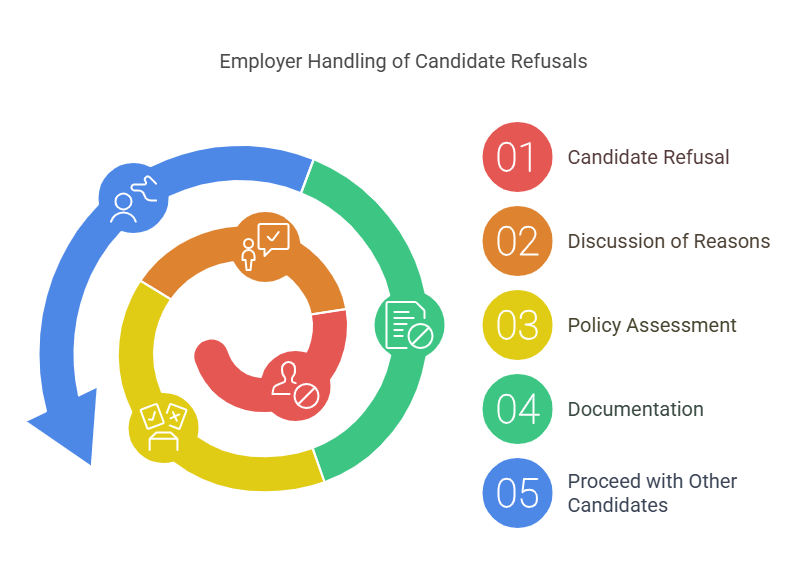
Employers generally include their screening policies in job postings or during initial interviews, ensuring transparency about expectations. When a candidate refuses to participate in a drug test or background check, employers typically:
- Discuss the reasons for refusal with the candidate.
- Assess whether the refusal aligns with company policy or industry regulations.
- Document the refusal for legal and procedural records.
- Proceed with other candidates who meet the screening requirements.
The Growing Importance of Screening in Remote Work
With the rise of remote work, pre-employment screenings have taken on added significance. Employers hiring remote employees may rely more heavily on background checks to verify a candidate’s credentials and trustworthiness, as they cannot directly oversee their work environment. Drug tests, while less common in remote settings, may still be required for positions involving sensitive information or digital security.
The Employer’s Right to Require Screening
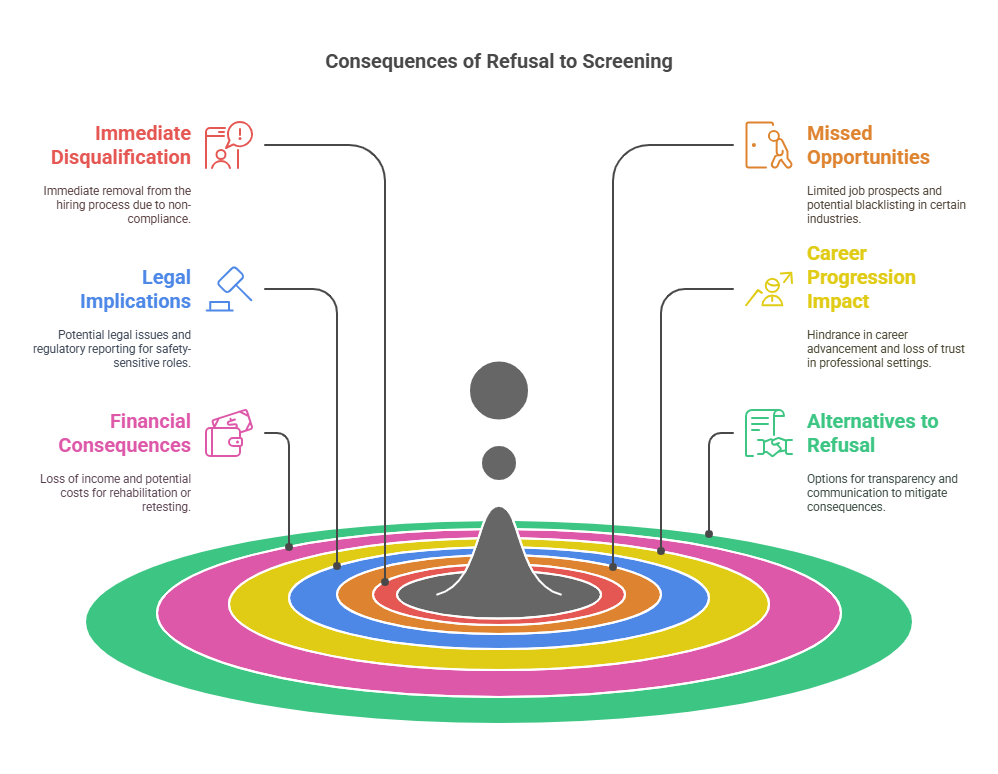
Employers have the legal right to include drug screening tests and background checks as part of their hiring process, provided they comply with applicable laws such as the Fair Credit Reporting Act (FCRA) and local regulations. These screenings are essential tools for identifying candidates who are trustworthy, reliable, and safe for the workplace. However, refusal to participate in these screenings can have far-reaching consequences, often leading to automatic disqualification from the hiring process.
Employers interpret compliance with screening requirements as a measure of professionalism and willingness to meet organizational standards. Refusal, on the other hand, often raises concerns about the candidate’s suitability for the role. Let’s explore the specific outcomes and implications of refusing a drug test or background check.
1. Immediate Disqualification from the Hiring Process
One of the most common consequences of refusing a drug screening test or background check is immediate disqualification. Many companies have strict policies that mandate these screenings for all applicants, and refusal is viewed as non-compliance. Employers often interpret this as an indication that the candidate may have something to hide, even if that is not the case.
Industries with Zero Tolerance for Refusal
Certain industries have zero-tolerance policies when it comes to pre-employment screenings. For example:
- Healthcare: Hospitals and clinics cannot risk hiring individuals with a history of substance abuse or criminal behavior that could jeopardize patient safety.
- Transportation: The Department of Transportation (DOT) mandates drug and alcohol testing for commercial drivers. Refusal to comply leads to immediate disqualification and could bar the applicant from working in the industry altogether.
- Education: Schools and educational institutions prioritize student safety, making background checks mandatory for all employees. A refusal could raise concerns about the individual’s character and fitness for working with children.
Impact on Employer Perception
Even in less regulated industries, refusal to undergo screening can damage an employer’s perception of a candidate. Employers may assume that the applicant:
- Is attempting to hide a substance abuse problem or a criminal record.
- Lacks the willingness to follow company policies.
- Is not committed to ensuring workplace safety or compliance.
In competitive job markets, where multiple candidates may meet the qualifications for a position, employers are unlikely to take risks with a candidate who refuses screenings.
2. Missed Employment Opportunities
Refusing a drug screening test or background check can significantly limit employment opportunities, particularly in industries where such screenings are standard practice. Candidates who refuse may find themselves excluded not just from the immediate position they applied for, but also from future opportunities within the same company.
Blacklisting in Some Industries
In certain fields, refusal to comply with pre-employment screenings can result in blacklisting. For instance:
- Transportation: Drivers who refuse DOT-mandated drug tests are often reported to the Federal Motor Carrier Safety Administration’s (FMCSA) Drug and Alcohol Clearinghouse, making it difficult for them to secure future employment in the industry.
- Government and Defense: Security clearance checks are mandatory for positions in federal agencies and defense contracting. Refusal to participate in these checks typically leads to permanent disqualification for such roles.
Reputational Impact
Word of a candidate’s refusal may spread, especially in tight-knit industries where employers share information. This can create a negative reputation that impacts the candidate’s ability to secure positions in the future.
3. Legal and Procedural Implications
Refusing a drug screening test or background check does not just affect a candidate’s job prospects; it can also lead to legal and procedural complications, depending on the industry and jurisdiction.
For Safety-Sensitive Roles
In roles where drug testing is required by law (e.g., DOT-regulated jobs), refusal is treated as equivalent to a failed test. This can result in:
- Mandatory reporting to regulatory bodies.
- Suspension or revocation of professional licenses or certifications.
- Ineligibility for future employment in similar roles.
For Candidates in Certain States
State laws vary regarding drug testing and background checks. In some states, candidates who refuse mandatory screenings may face additional consequences, such as being barred from unemployment benefits or legal claims related to wrongful termination.
Potential Civil Suits
If a candidate’s refusal to undergo screening leads to an incident after they are hired, the employer could face lawsuits for negligence. To mitigate this risk, many companies enforce strict “no refusal” policies.
4. Impact on Career Progression
Even if a candidate secures employment after refusing a drug test or background check, their refusal could create long-term obstacles to career advancement. Employers may view them as less trustworthy or committed compared to their peers, which could limit opportunities for promotions, raises, or additional responsibilities.
Loss of Trust
Refusal to comply with pre-employment screenings can create a perception of unreliability, even if the candidate has no history of misconduct. This loss of trust can affect:
- Relationships with supervisors and colleagues.
- Assignments to critical projects or roles.
- Overall career trajectory within the organization.
Missed Leadership Opportunities
Many leadership roles require additional screening or security clearances. A refusal during the initial hiring process could disqualify candidates from consideration for such roles in the future.
5. Financial Consequences
Refusing drug screening tests or background checks can also have financial implications for candidates. Unemployment due to disqualification can result in lost income, and finding alternative employment may take time. Additionally, certain industries may require candidates to cover the cost of drug tests or background checks if they refuse to comply initially and later reconsider.
Costs of Rehabilitation
If a refusal is linked to substance use, candidates may need to undergo rehabilitation or counseling before re-entering the workforce. These costs can be significant and are often not covered by employers.
6. Alternatives to Refusal
While refusing a screening may seem like the only option for candidates concerned about privacy or potential issues in their history, there are alternatives that can help mitigate the consequences.
Transparency and Communication
Candidates who are upfront about potential issues in their history may be able to work with employers to find a resolution. For example:
- Explaining Past Issues: If a candidate has a criminal record or a history of substance use, discussing these matters openly can demonstrate accountability and a commitment to improvement.
- Requesting Accommodations: In some cases, candidates can request exemptions or accommodations, especially if the issue is unrelated to the role’s responsibilities.
Pre-Screening Self-Checks
Candidates concerned about the results of a background check can conduct their own screenings beforehand. This allows them to identify and address any inaccuracies or red flags before applying for jobs.
Using Trusted Screening Services
Platforms like Exact Background Checks can help individuals verify their own records, ensuring accuracy and completeness. This proactive approach can build confidence during the hiring process and demonstrate a candidate’s commitment to transparency.
Comparison of Screening Processes
Below is a comparison of the steps involved in drug screening tests and background checks, along with their relevance to hiring decisions:
| Screening Type | Key Components | Relevance to Hiring Decisions | Timeline |
|---|---|---|---|
| Drug Screening | Urine, saliva, or hair sample analysis | Ensures workplace safety and compliance | 24–72 hours |
| Criminal Background | National, state, or local records search | Identifies potential risks based on past behavior | 1–5 business days |
| Employment Verification | Confirmation of past employment | Verifies candidate qualifications and experience | 3–7 business days |
| Education Verification | Confirmation of degrees or certifications | Ensures required credentials are valid | 2–5 business days |
| Credit Check | Review of credit history | Relevant for roles involving financial responsibilities | 1–3 business days |
Why Employers Partner with Exact Background Checks
Employers looking to streamline their hiring processes often rely on trusted screening providers like Exact Background Checks. By using our platform, employers benefit from:
- Accurate Results: Comprehensive reports that minimize the risk of errors.
- Fast Turnaround Times: Speedy results that keep the hiring process moving efficiently.
- Compliance Assurance: Adherence to all legal requirements, including FCRA and state-specific regulations.
For candidates, Exact Background Checks provides the tools to conduct self-screenings, ensuring they are fully prepared for the hiring process.



